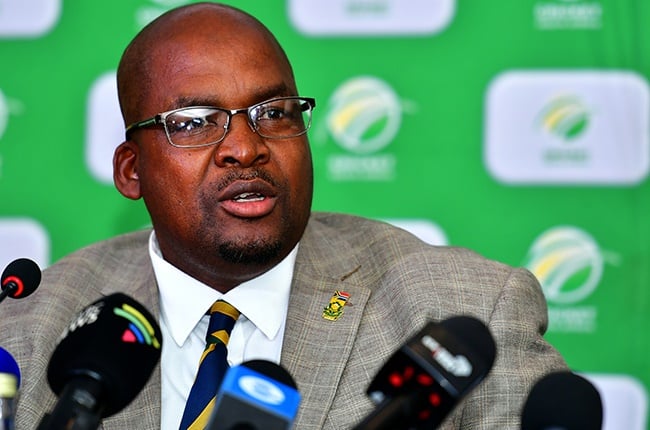


Cricket SA president Chris Nenzani during a media briefing at OR Tambo International Airport in Johannesburg on 7 December 2019.
Johan Rynners/Gallo Images)
- Last September, CSA amended its constitution to allow the president to serve an extra year after his two terms expired.
- Chris Nenzani says he regrets accepting the CSA board’s request to stay on for another year.
- Nenzani would not be drawn into whether he would accept nomination to stand for the vacant ICC chair position when his CSA term ends this September.
- CSA has swung from one PR scandal to another in the past year, including the protracted suspension of CEO Thabang Moroe.
Cricket South Africa (CSA) president Chris Nenzani said he regretted accepting the board’s proposal that his term be extended by another year after it lapsed last September.
Nenzani’s two terms of three years expired last year but he clung onto the position after the board amended its own constitution to allow him to serve longer than any previous CSA president.
Since then, CSA has bounced from one scandalous incident to another, which took a toll on the performances of the men’s Proteas team last summer and caused a major sponsor to flee.
Nenzani faced the media on Tuesday, who had burning questions about the state of cricket in the country as well as the public relations dramas caused by suspensions to CEO Thabang Moroe, among others, and sponsorship manager Clive Eksteen’s dismissal.
Eksteen wrote a scathing response to his dismissal on Tuesday, labelling his firing as “unfair” and confirmed he was taking the matter to the Commission for Conciliation, Mediation and Arbitration (CCMA).
Last week Moroe showed up at the CSA offices in Rosebank, Johannesburg, six months after being suspended in December. It has since been discovered that Moroe’s disciplinary hearing has yet to even take place and hinges on the results of an independent forensic investigation into cricket’s affairs.
“When you look back, surely there will be a sense where you think you could have done this and that differently,” said Nenzani.
“The first thing I could have done differently was to ensure that transformation in this country is implemented on a radical scale.
“The second – I’ve discussed it with a few people – when the Members Council asked me to stay on for an additional year when my term came to an end, I agreed.
“Looking back, I regret taking that decision. I should have never [continued]. But it is because of how I view leadership.
“To me, election to an office or position means you have an obligation to serve the people who’ve elected you. Therefore, when they say please continue, you subject yourself to that directive.”
Nenzani confirmed that his tenure would be over, however, at this year’s annual general meeting (AGM), along with two other non-independent directors.
“At the 5 September AGM, the term of the board does not entirely come to an end,” he said.
“There are three non-independent directors whose terms would expire at the end of that AGM, including the president’s term. My term is coming to an end.
“Three independent directors, who had filled in the casual vacancies, their term will also expire at the AGM. That’s why it is important for the Members Council and CSA executive to begin preparing for the AGM, so that you follow all the necessary notices and processes.”
Asked whether he had designs on the soon to be vacant International Cricket Council (ICC) chair position, Nenzani referred to a gag order issued by the world cricket governing body prohibiting anyone from making public pronouncements.
Current ICC president Shashank Manohar confirmed that he would not seek re-election.
“It would be premature for me to make any pronouncement,” Nenzani said.
“The ICC has placed a moratorium on whether people express their desire or not.
“They have not opened the process of nominations. On 25 June, they will meet to discuss the challenges created by Covid-19 – looking at business continuity contingencies, which includes some events in the near future – and the issue of the change of chairmanship.
“They need to agree on a process, then they can declare that nominations are open. Only then will people be able to say yes you wish to stand or no you don’t.”

